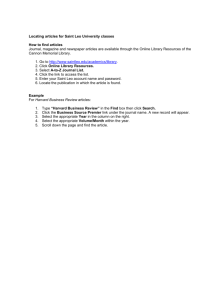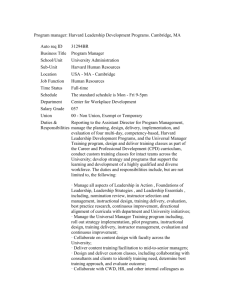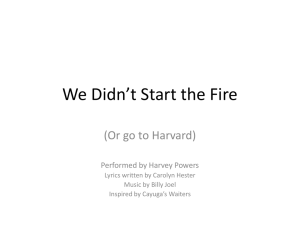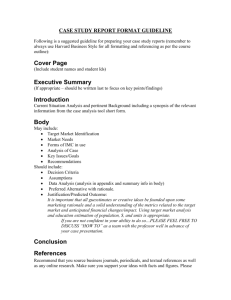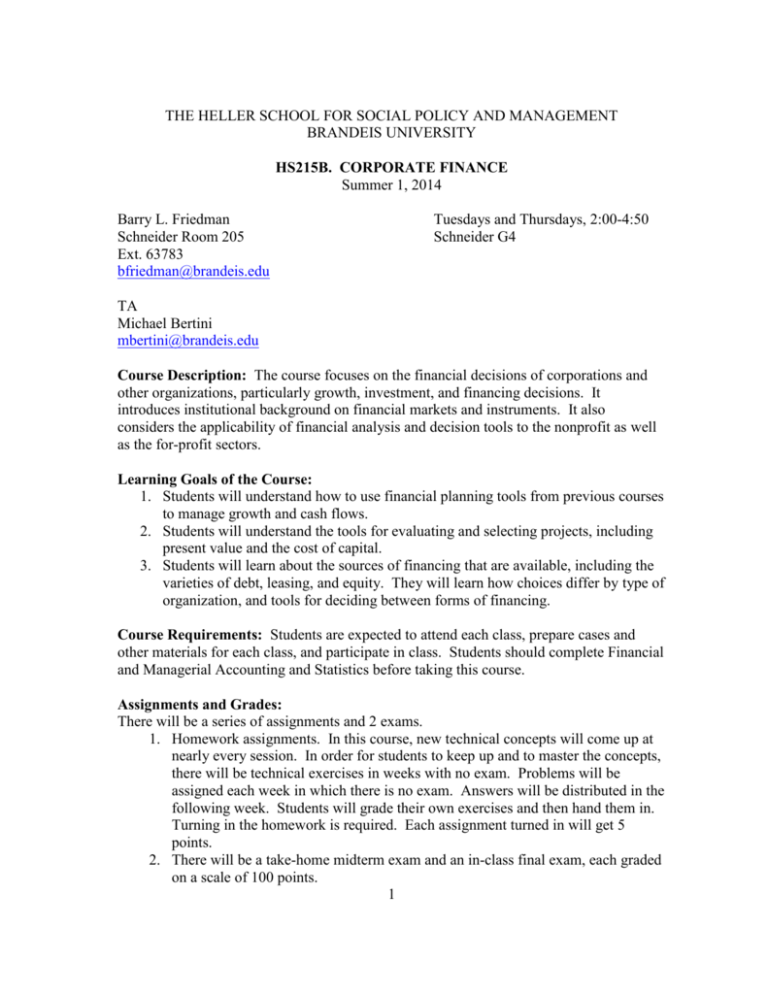
THE HELLER SCHOOL FOR SOCIAL POLICY AND MANAGEMENT
BRANDEIS UNIVERSITY
HS215B. CORPORATE FINANCE
Summer 1, 2014
Barry L. Friedman
Schneider Room 205
Ext. 63783
bfriedman@brandeis.edu
Tuesdays and Thursdays, 2:00-4:50
Schneider G4
TA
Michael Bertini
mbertini@brandeis.edu
Course Description: The course focuses on the financial decisions of corporations and
other organizations, particularly growth, investment, and financing decisions. It
introduces institutional background on financial markets and instruments. It also
considers the applicability of financial analysis and decision tools to the nonprofit as well
as the for-profit sectors.
Learning Goals of the Course:
1. Students will understand how to use financial planning tools from previous courses
to manage growth and cash flows.
2. Students will understand the tools for evaluating and selecting projects, including
present value and the cost of capital.
3. Students will learn about the sources of financing that are available, including the
varieties of debt, leasing, and equity. They will learn how choices differ by type of
organization, and tools for deciding between forms of financing.
Course Requirements: Students are expected to attend each class, prepare cases and
other materials for each class, and participate in class. Students should complete Financial
and Managerial Accounting and Statistics before taking this course.
Assignments and Grades:
There will be a series of assignments and 2 exams.
1. Homework assignments. In this course, new technical concepts will come up at
nearly every session. In order for students to keep up and to master the concepts,
there will be technical exercises in weeks with no exam. Problems will be
assigned each week in which there is no exam. Answers will be distributed in the
following week. Students will grade their own exercises and then hand them in.
Turning in the homework is required. Each assignment turned in will get 5
points.
2. There will be a take-home midterm exam and an in-class final exam, each graded
on a scale of 100 points.
1
Missed Classes: If you must miss a class, you must inform the instructor or a TA and turn
in any assignment due at that class.
Course Reading: The text for the course is:
Jonathan Berk, Peter DeMarzo, and Jarrad Harford, Fundamentals of Corporate
Finance, Pearson Prentice Hall. Third edition.
There will also be cases. Harvard Business School cases may be obtained at the Harvard
web site:
https://cb.hbsp.harvard.edu/cbmp/access/27046448
Provisions for Feedback: The homework assignments will be self-graded based on
answers to be distributed at the end of the week. The midterm and final will be graded.
Students are welcome to discuss issues with the TA or the instructor.
Academic Integrity: Academic integrity is central to the mission of educational
excellence at Brandeis University. Each student is expected to turn in work completed
independently, except when assignments specifically authorize collaborative effort. It is
not acceptable to use the words or ideas of another person--be it a world-class
philosophers or your lab partner--without proper acknowledgement of that source. This
means that you must use footnotes and quotation marks to indicate the sources of any
phrases, sentences, paragraphs or ideas found in published volumes, on the internet, or
created by another student. Violations of university policies on academic integrity,
described in Section 3 of Rights and Responsibilities, may result in failure in the course or
on the assignment, and could end in suspension from the University. If you are in doubt
about the instructions for any assignment in this course, you must ask for clarification.
Notice: If you have a documented disability on record at Brandeis University and require
accommodations, please bring it to the instructor’s attention prior to the second meeting of
the class. If you have any questions about this process, contact Mary Brooks, disabilities
coordinator for The Heller School at x 62816, or at maryeliz@brandeis.edu.
2
Course Schedule
In some weeks, the cases listed relate to the theoretical topics developed in the
previous session rather than the current session. There will be a TA session every week.
The chapter numbers from the text given below refer to the third edition of the text, but are
the same in the second edition.
May 27
Review of Basic Financial Analysis Concepts
Text, chapters 1, 2
Jones Electrical Distribution, Harvard Case 4179
Review of Present Value
Text, chapter 3
I.
Applications of Present Value
May 29
More on Present Value
Yoland Research Institute (a nonprofit case)
Bond Valuation
Text, chapter 5 on interest rates (optional)
Text, chapter 6
June 3
Bond valuation case
Walt Disney Co.’s Sleeping Beauty Bonds, Harvard Case 294034 (exercise)
Stock valuation
Text, chapter 7
II.
Valuation of the Firm and Capital Budgeting
June 5
Free cash flow; Capital Budgeting
Text, chapter 8, section 8.2. Rest of chapter is optional.
Text, chapters 9, 10
June 10
Risk and Return in Capital Markets
Text, chapter 11
Capital Asset Pricing Model (CAPM)
Text, chapter 12
3
June 12
CAPM case
Communications Satellite Corporation, Harvard Case 9-276-195
Cost of capital; Weighted Average Cost of Capital (WACC)
Text, chapter 13 (12)
Pioneer Petroleum, Harvard Case 9-292-011
Midterm Exam Distributed (take-home)
June 17
Capital Budgeting Comprehensive Case
University of Virginia Health System: The Long-term Acute Care Hospital Project,
Darden Case UV6518, available through Harvard cases
III.
A Digression on Financial Planning and Management
Financial Planning and Pro Forma Statements
Text, chapter 18
Working Capital Management
Text, chapter 19
June 19
Pro Forma Exercise
IV.
Financing decisions
Equity and Debt Financing
Text, chapters 14 and 15. Institutional background on equity and debt
Midterm Exam Due
June 24
Capital Structure
Text, chapter 16
Debt and equity case: the microfinance industry
Unitus(A): Microfinance 2.0—Reinventing an Industry, Stanford Case SI-87A,
available through Harvard cases
Unitas (B) Microfinance 2.0—Reinventing an Industry, Stanford Case SI-87B,
available through Harvard cases
June 26
Leverage Decision Case
Blaine Kitchenware, Inc.: Capital Structure, Harvard Case 4041
Lease financing
4
June 30 (Monday)
Capital Structure: evolution over time
Quorum Health Group, Inc., Harvard Case 9-295-156
July 1 (Tuesday)
Final Exam in class
5




